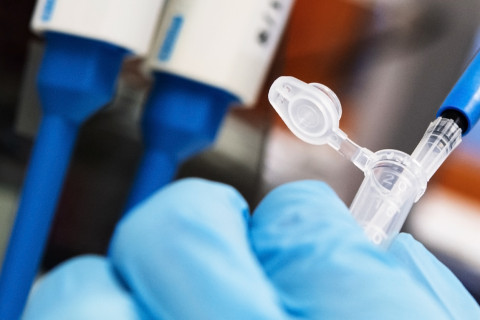A study conducted at the University of Eastern Finland found distinct signatures in CD8-positive T cells in blood samples from children with newly diagnosed type 1 diabetes and in autoantibody-positive children who later developed type 1 diabetes. The study was published in the journal Diabetes.
Type 1 diabetes is an autoimmune disease which usually develops in childhood. The symptomatic onset of type 1 diabetes results from a T-cell mediated destruction of insulin-producing beta cells in the pancreas. CD4-positive helper T cells orchestrate the autoimmune response, while CD8-positive cytotoxic T cells directly contribute to the destruction of the beta cells. Interestingly, a specific blood CD8-positive T-cell signature has recently been associated with a beneficial response to immunotherapy treatments aiming to delay the onset of type 1 diabetes.
In the current study, led by Professor Tuure Kinnunen at the University of Eastern Finland, two distinct signatures were detected in a subset of circulating, highly differentiated CD8-positive T cells in children at different stages of type 1 diabetes development. A proinflammatory signature consisting of an increased frequency of T cells producing proinflammatory cytokines, such as IFN-γ and TNF-α, was detected in children with newly diagnosed type 1 diabetes. In contrast, in autoantibody-positive at-risk children who later developed type 1 diabetes, an increased frequency of T cells expressing the co-inhibitory receptors KLRG1 and TIGIT was detected. Importantly, the latter signature resembles the CD8-positive T-cell signature associated with a beneficial response to immunotherapy in earlier studies.
“Our findings suggest that before disease onset, children who later progress to clinical type 1 diabetes have a distinct CD8-positive T-cell profile detectable in their blood samples. It could be envisioned that this is a potential, but eventually failing attempt of the immune system to harness the harmful autoimmune response. In the future, these T-cell signatures could potentially be used to develop better biomarkers for evaluating the risk of developing type 1 diabetes, and who would benefit from preventative immunotherapy. Additionally, a deeper characterization of these interesting cell types is warranted to better understand the type 1 diabetes disease process”, University Teacher Anna-Mari Schroderus, the lead author of the study notes.
This study utilized samples from the unique Finnish DIPP follow-up study where children with a genetic risk for the development of type 1 diabetes are followed from birth. The study also involved researchers from the universities of Turku, Oulu, and Helsinki, and Kuopio University Hospital.
For further information, please contact:
University Teacher Anna-Mari Schroderus, University of Eastern Finland, School of Medicine, [email protected]
Professor Tuure Kinnunen, University of Eastern Finland, School of Medicine, [email protected], tel. +358 50 562 9349
Research article
Anna-Mari Schroderus, Viola Pitkänen, Ilse Ekman, Daniella Stevens, Marja Rytkönen-Nissinen, Reeta Rintamäki, Jussi Pihlajamäki, Mikael Knip, Riitta Veijola, Jorma Toppari, Jorma Ilonen, Johanna Lempainen, Tuure Kinnunen; Temporal Alterations in CD8+ T Cells During the Progression from Stage 1 to Stage 3 Type 1 Diabetes. Diabetes 2024; db240159. https://doi.org/10.2337/db24-0159
